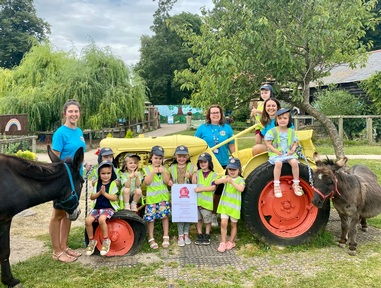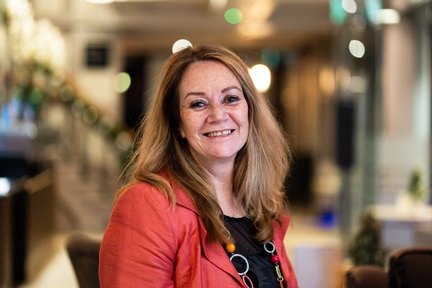EYFS has led to a tracking culture where nurseries try and 'measure the unmeasurable'
The Early Years Foundation Stage (EYFS) has led to a tracking culture in England where nurseries feel compelled to collect extensive progress data to justify the public funding they get, according to a new documentary exposing how the EYFS changed the whole ethos of nurseries.

The short film features Nancy Stewart, the former project lead on the Birth-to-Five Matters and the author of the original Development Matters, which was designed to help practitioners implement the EYFS.
She reveals in the film made by Famly, which produces nursery management software, how the EYFS led to a tick box approach in many nurseries across England, which she wants to see scrapped.
In the revised EYFS which comes into force in September, the Department for Education (DfE) and education watchdog, Ofsted, have both made it clear they don’t want to see practitioners busy on ipads collecting data, they want to see them supporting children with their learning and development.
But Nancy Stewart fears it has become endemic and says in the film ‘The EYFS Tracking Lie’: “Tracking has been a central approach in early years settings for some years, so many practitioners haven't worked in any other way and may have taken for granted that it's best practice”.
Detailed tracking wastes valuable time
She says: “This engaging video helps to put it in perspective, and features voices from all quarters agreeing that detailed tracking wastes valuable time that would be better spent supporting children's development and learning.
“Hopefully, it will help give practitioners confidence to let go of a familiar but less valuable way of working, ready to explore new approaches that will be better for both them and the children."
Ms Stewart believes the need to acquire such extensive data on children’s progress originated from when nurseries began to receive government funding for three to four-year-olds.
“Nurseries were getting a lot of public money” and there began to be a desire to make them accountable, with the pressure coming from Ofsted and local authorities. Nurseries tried to measure children’s progress “but a lot of the things children do you can’t measure”, says Ms Stewart.
It has become a 'numbers game'
She saw it quickly become a “numbers game” which took nurseries down a “blind alley” and “took people away from spending time, really tuning into children and caused them a lot of work that was not helpful”.
The documentary also features clips from Ofsted’s Wendy Ratcliff and Julian Grenier, author of the new Development Matters, along with Dr Sue Allingham and Ruth Pimentel the former head of Early Years at National Strategies and now chief executive of Kindred Nurseries, who says in the documentary: “Whatever we look at, however we move forward, it’s getting that message out that any assessment or any tracking that we’re doing, any observing of children is there purely to enable you as a practitioner to plan the right amount of activities or plan the environment in the right way or support children in the right way to help them progress.”
The documentary reveals how supportive documents became misused, and how government pressure came down on early years settings to prove that children were meeting expected targets - all to the detriment of children’s learning and the mental health of early years practitioners.
The revised EYFS comes into force for all early years settings in England in September 2021. The changes are designed to support the DfE's plan to raise standards in early education, particularly in early language and literacy, in order to improve outcomes for all children, particularly disadvantaged children. The new framework also aims to reduce unnecessary paperwork for early years practitioners and reception teachers giving them more time to interact with children in their care.
The last time the EYFS was changed was in 2011 during the Tickell Review. However nursery leaders have expressed concern the new EYFS has too much of a focus on preparing children for year one in school, with younger children pushed to the side.
New EYFS moves away from tracking child development
Matt Arnerich, head of Learning and Development at Famly said: “The new EYFS and all the material around it talks about reducing workload and moving away from tracking child development by ticking boxes. But we were hugely disappointed to see this didn’t involve any kind of consultation with the software providers who were giving settings the tools to do this tracking.
“They were asking people to paint in a different way without thinking for a second about talking to the paintbrush manufacturers.
“So we went out alone, got together with Ofsted and lots of experts to understand how we can change our software for the better. Together with hundreds of settings we’ve come up with a new way of noting, understanding, and sharing child development - without interfering in it."
To coincide with these changes changes to their software, Famly have released this documentary for the early years sector - explaining the history of how nurseries have become so bogged down in tracking paperwork and statement-ticking.
Mr Arnerich added: “Along the way, we learned a huge amount about what got us into this mess to begin with - and it was a crazy story. Absurd at points, out of control, and fundamentally driven by an approach to education policy that was backwards.
'Everyone in this sector deserves better'
“Everyone in this sector deserves better - and we hope this documentary is going to help educators feel confident that they don't have to keep doing things the way they've always done them.”
He has found through making the film that “the things that have been put in place to support our children” have ended up doing “the opposite”.
“We're hoping if we can explain to people where these absurd expectations came from, they might feel more comfortable moving forward to a new way that's fundamentally better for the children and the adults who educate them,” he says.
To watch the documentary, and find out more about Famly’s software, click here
Latest News
 24-Apr-24
Find out the top nurseries in 2024
24-Apr-24
Find out the top nurseries in 2024
 06-Jun-23
UK's top nurseries in 2023 revealed
06-Jun-23
UK's top nurseries in 2023 revealed
 16-Dec-22
Winter Wonderland: Ice sculptures, aerial acrobatics and white knuckle rides
16-Dec-22
Winter Wonderland: Ice sculptures, aerial acrobatics and white knuckle rides
 28-Nov-22
5 mins with Caroline Wright, early childhood director at Bright Horizons
28-Nov-22
5 mins with Caroline Wright, early childhood director at Bright Horizons
 25-Nov-22
Camilla gives nursery children Paddington bears left as tribute to Queen Elizabeth II
25-Nov-22
Camilla gives nursery children Paddington bears left as tribute to Queen Elizabeth II